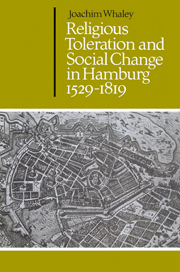Book contents
- Frontmatter
- Contents
- Preface
- Abbreviations
- Illustrations
- Introduction
- 1 The struggle for political stability and purity of belief: Hamburg from Reformation to French Revolution
- 2 The politics of toleration: the Catholic community
- 3 The limits of toleration: Sephardim and Ashkenazim
- 4 The growth of toleration: the Calvinist communities
- 5 Patriotism versus Orthodoxy: the struggle for limited religious freedom, 1760–85
- 6 The image of the city: the search for a tolerant society in early modern Hamburg
- 7 The aftermath
- Bibliography
- Index
4 - The growth of toleration: the Calvinist communities
Published online by Cambridge University Press: 18 September 2009
- Frontmatter
- Contents
- Preface
- Abbreviations
- Illustrations
- Introduction
- 1 The struggle for political stability and purity of belief: Hamburg from Reformation to French Revolution
- 2 The politics of toleration: the Catholic community
- 3 The limits of toleration: Sephardim and Ashkenazim
- 4 The growth of toleration: the Calvinist communities
- 5 Patriotism versus Orthodoxy: the struggle for limited religious freedom, 1760–85
- 6 The image of the city: the search for a tolerant society in early modern Hamburg
- 7 The aftermath
- Bibliography
- Index
Summary
The history of the gradual acceptance of the Catholics and Jews demonstrates two extremes of the experience of religious minorities in Hamburg. The Catholics were tolerated almost exclusively because of the city's perennial dependence on their patron, the Holy Roman Emperor. Political and diplomatic factors predominated, while the economic considerations, which had led to the initial acceptance of Catholic merchants in the period around 1600, diminished in importance as the community lost its mercantile character. Social isolation and poverty, rather than wealth and status, characterised the Catholic community after about 1630. In the case of the Jews, who lacked an official Imperial or princely patron, economic factors were of crucial importance; they continuously played an important economic role, even though the character of the community changed considerably with the decline of the original Sephardic element and the increasing predominance of the Ashkenazim. For the Jews supplied skills and trades which did not on the whole compete with those of the citizens of Hamburg, and which made a valuable contribution to the urban economy. It was the recognition of this fact which stimulated the efforts of the 1730s and 1740s to find a more satisfactory solution to the synagogue issue.
Attitudes to neither group, however, ever went substantially beyond the desire for a more clearly defined legal relationship.
- Type
- Chapter
- Information
- Religious Toleration and Social Change in Hamburg, 1529–1819 , pp. 111 - 144Publisher: Cambridge University PressPrint publication year: 1985



